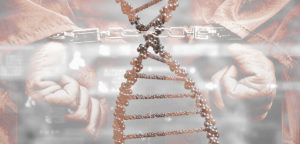The backlog of sexual assault kit samples in crime laboratories across the nation is a topic that hit the spotlight when a group of journalists uncovered the issue in an open records search of crime lab records in 2015. Reasons for the backlog include lack of staff, lack of funding, and simply, lack of time or a decision not to prosecute the case. Processing samples can be a labor-intensive process.
We recently interviewed Lynndsey R. Simon, Forensic Scientist II and Alternate CODIS Administrator from the Columbus Police Forensic Services Center to discuss some recent changes in sample processing in their laboratory that are helping to alleviate some of the backlog. She will be presenting a talk at the upcoming International Symposium on Human Identification (ISHI) in September.
The Columbus Police Forensic Services Center is a smaller forensic laboratory and according to Simon, one of the biggest challenges they face is strained resources. The DNA extraction and processing kits that forensic laboratories use are very expensive, and the number of DNA samples that laboratories are getting for DNA analysis are increasing. With limited resources and funding, maximizing efficiency and finding the best solutions for the laboratory becomes critical.
One type of extraction that crime labs often perform is a differential extraction, especially in sexual assault samples, to separate Y-chromosome DNA from other DNA in the sample. The manual differential extraction protocol used in the Columbus lab is laborious and can take up to 4 hours. The laboratory has a “direct-to-DNA” approach with sexual assault kit samples, meaning no presumptive testing is carried out—all samples are subjected to the manual, differential extraction method. However the long processing time and the limited number of samples (only 28 can be processed in a 24 hour period) that can be processed is an issue.
To address turnaround time and the limited sample throughput, the Columbus lab evaluated the Promega Casework Direct Kit, Custom for Y-chromosome screening and evidentiary selection of samples. Using the Casework Direct Kit the lab has been able to process a larger number of samples because the Y-screening process takes only 30 minutes. This allows Simon and her colleagues to accept more sexual assault kit samples up front. Only a few of the samples screened require the more intensive differential extraction based on the [Auto]/[Y] ratio from the casework direct screening. This gain in efficiency is helping to reduce the turnaround time for their sexual assault cases.
Before we would attempt to limit the sample number to speed up the laboratory processing. But there isn’t a need to limit samples anymore. This is helping to reduce the turnaround time for our sexual assault cases.
The Columbus laboratory does not currently have a backlog of sexual assault samples, so they are able to work them as they receive them. The lab also has a process in place to streamline processing as much as possible. Cases are processed in batches, and one batch can have 100 samples—all of which can be completed in approximately 30 minutes. Each case is assigned a priority score, and that priority score determines the turnaround time.
In addition to Y-screening of sexual assault kit swabs, the Columbus lab processes touch samples from sexual assaults, either in the kits or from clothing. They discovered during the validation of the Casework Direct Kit for screening, that samples processed using Casework Direct method had consistently higher quantification values than their current EZ1 extraction method. These higher quantification values have been borne out in casework too. The laboratory is currently in the process of validating the Casework Direct method for use on other sample types like cigarette butts and bottles and cans. They have already validated the Casework Direct extraction method on blood samples and have seen improved recovery and even improved DNA profiles. The lab is looking to further reduce turnaround time and free up analyst time by introducing the QIAcube robot into their differential extraction process.
Michele Arduengo
Latest posts by Michele Arduengo (see all)
- The Casual Catalyst: Science Conversations and Cafes - July 18, 2024
- Cancer Moonshot: Solving Tough Problems - May 28, 2024
- Automated Sampling and Detection of ToBRFV: An Emerging Tomato Virus - April 25, 2024


One thoughtful comment